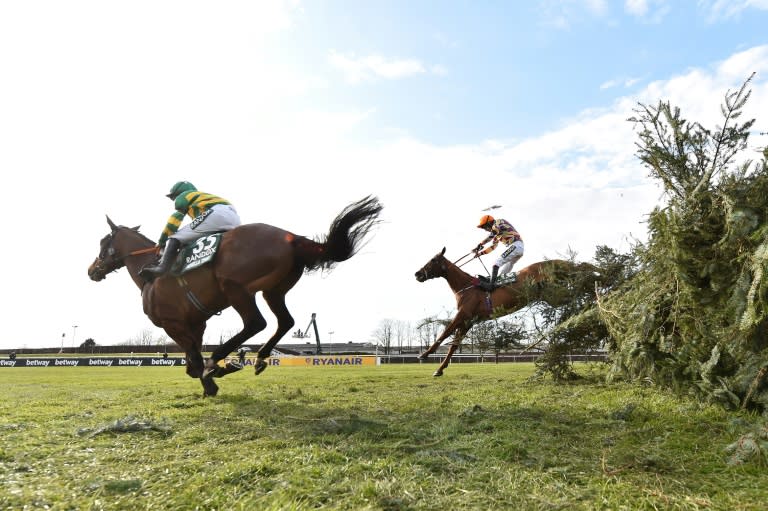Reformed Grand National in danger of losing 'iconic' status

The Grand National remains an "iconic race", 2021 winning trainer Henry de Bromhead told AFP, despite recent reforms leaving the world's most famous steeplechase close to "the last chance saloon", a leading bookmaker warned.
Saturday's edition of the race first staged in 1839 with its fearsome 30 fences has never lacked for drama - from the Queen Mother's Devon Loch belly flopping when near the finishing post in 1956 to three-time winner Red Rum passing long time leader Crisp on the line in 1973.
However, along with the fairytale stories there have been the downsides too and with five equine fatalities in the last four editions, although not all were due to falls, further alterations have been made.
The 2024 renewal at Aintree will be the first with the field reduced from 40 to 34 (66 horses lined up in 1929), a shorter run to the first fence and the 11th fence - an open ditch - has been reduced in size.
The changes came after a review of last year's race, which was delayed for 15 minutes due to animal rights protestors, and Hill Sixteen being put down after a first fence fall.
Protestors announced this month they would not be disrupting the race this weekend.
De Bromhead's winner Minella Times also provided a stirring story with jockey Rachael Blackmore becoming the first woman jockey to win the greatest steeplechase in the world.
For the thoughtful de Bromhead even with the alterations -- the latest after a series of them down the years -- the event remains very special.
"It is still an iconic race," said the 51-year-old Irishman, who has three runners this year including 2021 Cheltenham Gold Cup winner Minella Indo.
"Of course it is massive to lose a horse, no one likes to go home with an empty horse box.
"However, the authorities have definitely put a lot of work into the review and decided to make it safer which they felt they needed to do."
- 'Letting their hair down' -
For William Woodhams, CEO of the world's oldest bookmakers Fitzdares, a visit to a stables would be a salutary experience for those who believe horses are treated as cannon fodder.
"They're like members of the family and you can see how much it means to those connected to the horse when they really sadly don't make it back from the racecourse," he told AFP.
However, Woodhams believes the National should not be further "watered down" as it is in danger of losing its raison d'etre or unique status.
"Maybe not last chance saloon but we're getting close," he told AFP.
"Obviously the optics over the past couple of years haven't been great but we mustn't be apologetic for what is one of racing's greatest assets.
"There's nothing like the Grand National anywhere in the world. We should embrace its uniqueness and the one-off challenge it presents.
"Reducing the field size or the distance even further would be an absolute disaster, for me."
Ordinarily the National is a betting bonanza for bookmakers but the urbane Woodhams, who prior to Fitzdares spent six years with luxury goods firm LVMH, says the reduced field will have ramifications.
"It's the one time of the year where it's entirely acceptable to choose your horse based on names, numbers, colours, or a combination of the three and everyone does it," he said.
"In that sense, turnover is always going to be high but the reduction in runners in the race is an obvious concern with us offering reduced eachway terms.
"This is obviously going to switch some people off from having a bet in the big race."
There have been some rumblings too regarding the reduced field tilting the balance even further in favour of the two big hitting trainers from Ireland, Willie Mullins and Gordon Elliott.
"Willie and Gordon are possibly going to make up roughly half the runners on the day," said Woodhams.
"That just can't be a good thing.
"That said, I'm not sure how you stop it, there's just more horses that are capable of winning the race from those yards at the moment."
Woodhams adds the passion of Liverpudlians for the race and the attention it brings to the city should not be discounted either.
"Don't underestimate it's value to Liverpool," he said.
"They take great pride in hosting the biggest race on the planet
"It's one of the few places where you will find the bigwigs of racing letting their hair down."
pi/nr

 Yahoo Sport
Yahoo Sport 





































